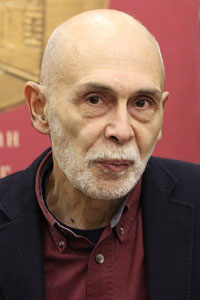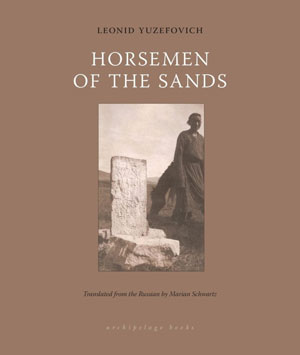A Conversation with Translator Marian Schwartz
Interview by Ryan K. Strader
“If books don’t get published, they don’t live,” argues Marian Schwartz, the prolific and award-winning translator of over seventy Russian works. Thanks to Schwartz, significant 20th and 21st century Russian books have been brought to life, including work by Nina Berberova, Polina Dashkova, Mikhail Shishkin, and now Leonid Yuzefovich.
While doing research for Cleaver’s review of Yuzefovich’s Horsemen of the Sands, I was intrigued by Schwartz’s commitment to bringing Yuzefovich to English readers. She has translated the first of three novels in a historical detective trilogy by Yuzefovich (Harlequin’s Costume, 2001). And now Archipelago Books has just published Horsemen of the Sands, which contains both the title novella and a more recent novella, The Storm. Schwartz graciously allowed me to interview her about her advocacy for contemporary Russian literature in general, her appreciation for Yuzefovich in particular, and why we should read more translated literature.—Ryan K. Strader
Ryan K. Strader: You translated Yuzefovich as early as 2001, and in a wonderful 2010 interview with The Writer’s Guide, you describe Yuzefovich as a Russian novelist who you think the rest of the world should be reading. What is it about Yuzefovich’s work that has drawn your consistent admiration and support?
Marian Schwartz: I’m a major advocate for him and am looking forward to getting much more of his work translated. Not only is his writing elegant and intelligent, his subject matter and his approach to that subject matter will appeal to the English-language reader. He knows how to tell very human stories set in the modern day but also very human stories set in the past, and in that sense I find him tremendously compelling.
RKS: When did you first read Horsemen of the Sands?
MS: I read it fairly late, long after I’d read and translated The Storm, for example. The book was originally published in the early eighties and had recently been reissued in Russian, and he suggested that I might find it worthwhile, which I did. This is one of the few early publications that he felt had stood up.

Leonid Yuzefovich
RKS: Horsemen of the Sands features a historical figure, General Ungern, who fought for control of Mongolia during the Russian Civil War. You mentioned Yuzefovich’s “historical angle,” and I know he has written about General Ungern before. Can you tell us how his interest in history influences his work?
MS: He’s a historian by training, and his dissertation was on medieval diplomacy. He wrote about General Ungern before, in Autocrat of the Desert, which isn’t available in English. Also, a book of his that won several prizes last year, The Winter Road, is from the same period, the late Civil War in Russia.
You can see his background in the meticulous and loving detail. In the earlier versions of the story he included a great many Chinese and Mongolian words relating to details of the culture, religion, history, and so forth, so many that he actually took out some them for the second edition, having realized that when he wrote it he was so taken by Mongolian culture that wanted to include everything he could, and now he realized that at some point it started getting in the way of the story. His love of Mongolia persists. When he wins a prize, his treat to himself is to buy an artifact from Mongolia, like a little Buddha, so he has quite a few artifacts now at his apartment.
RKS: In Horsemen of the Sands, you didn’t always translate the word gau, the word for the amulet—why did you keep that word?
MS: The gau is a key image in the text and acquires a definite emotional overlay in the course of the story. I kept it, but I interspersed it with the word “amulet” sometimes, for two reasons. First, to remind the reader of what it meant. But second, to emphasize the outsider’s gaze that Yuzefovich establishes in the book. One of the important themes in the book is the outsider’s encounter with an exotic culture—what to them is an exotic culture—and using the foreign word is a way to introduce that outsider gaze.
In fact, the author is not the only “other” involved. There is also the narrator, a Russian officer serving on the Mongolian border in the 1970s, and there is Baron Ungern himself, also a European, who has become obsessed with Mongolia to a much greater extreme than the narrator or the author. On the one hand, you want to keep that sense of their fascination through the use of the exotic word, but you want to remind the reader of the ever-present duality. There were several other instances of foreign words that I kept, both to feed the reader’s fascination with this exotic culture but also to emphasize that the author/narrator/Ungern/reader are “other.”
I think that English readers have had a fairly narrow idea of what Russian literature and culture are, and I think it’s about time that situation changed.
RKS: You just returned from a visit to Moscow, where you spent some time with Yuzefovich. Can you tell our readers a little bit about when you first met him and your current relationship with him?
MS: I first met him after I had started translating him. We had had email correspondence in connection with the first book I translated, Harlequin’s Costume. So we had been in touch then but had not met. Then, about six years ago, when I was in Moscow for a conference, we met there.
We’ve seen each other a few times now, including in New York for Russian Literature Week, an annual event put on by Read Russia, which brings in Russian writers and translators for literary events around the city. In 2016, Yuzefovich came and I took him sightseeing. His son had told him he had to see the Village, so we took the subway down from Lincoln Center. We went to a diner for breakfast, which he loved—we had a wisecracking waitress and quintessential diner food, all of which he thought was great. That was a lot of fun. We did the quintessential West Village walking tour, finding the narrowest house and various authors’ houses. Our route took us past my old haunts in the South Village, through Washington Square, and all the way to the Flatiron Building. At the end of the day, he made a very interesting comment. He said that he liked New York because it was a city of the 20th century. Cities in Europe, including Moscow, have a very long history, so you’re looking at beautiful and fascinating but very old buildings. But New York is a city of his century, built largely during his lifetime.
 RKS: There are several beautiful scenes in Horsemen of the Sands. My favorite one is when the narrator describes the East and West as mirrors on either side of Russia: “Russia looked first at the right, and then at the left, each time amazed that its reflection in one mirror did not look like its reflection in the other.” I’m curious about your favorite scene from the novella, and what you think makes that scene compelling.
RKS: There are several beautiful scenes in Horsemen of the Sands. My favorite one is when the narrator describes the East and West as mirrors on either side of Russia: “Russia looked first at the right, and then at the left, each time amazed that its reflection in one mirror did not look like its reflection in the other.” I’m curious about your favorite scene from the novella, and what you think makes that scene compelling.
MS: In the beginning of the story, when the narrator sees the herder Boliji for the first time, Boliji is sitting with his back to the river and looking out at the land. Similar to your idea of the East and the West, the idea of looking at the world completely differently. As Westerners, we don’t sit with our back to water and look at the land, but that’s what Boliji does. This is one of the reasons we like foreign literature: it makes us think of things we have never thought before, that aren’t part of our culture.
RKS: What about The Storm, the other novella in this volume? Do you have a favorite scene or image from that story?
MS: The scene Nadezhda Stepanovna goes to buy the berries hit me hard. There’s so much tension in the story there, so much emotional intensity.
She sets off with the simple intention of buying berries, but the process becomes intensely emotional—anything but an ordinary purchase. The way Yuzefovich develops her anxiety is brilliant. I’m often interested in how writers bring the reader along from one emotional state to another. The scenes like this that work are the ones that do so in tiny steps. The most famous example I can think of is in Anna Karenina, when she goes to the train station at the end of part seven. Starting out, she’s not thinking about killing herself, but by the time she throws herself under the train, we’re there with her. Tolstoy has taken us through minute gradations of emotional change, so that when the time comes it’s perfectly obvious she’s going to kill herself. It seems inevitable. Yuzefovich is able to do that as well, to move the character along from one emotional state to another.
RKS: You’ve translated more than seventy books now. What do you hope that American audiences learn from the Russian texts you’ve translated?
MS: One of the reasons that I became a translator—besides the fact that I like doing it—was that I felt it was the one thing I thought I could do better than a Russian could do. I was never going to be a scholar, but I could write in English and I could translate. I could help broaden the reading audience for the literature that had meant so much to me. If books don’t get published, they don’t live. We are only now recovering much of the 20th century, which was little known behind the Iron Curtain and little published until that barrier fell.
Just as when two readers read a book and have two different understandings of it, the translation is another reader. So the translation is a new book, heavily based on another book, but in many ways a new book. People don’t like to think about it, but it’s so.
I think that English readers have had a fairly narrow idea of what Russian literature and culture are, and I think it’s about time that situation changed. I want to bring out books that work differently, that are written differently, and that show different aspects of the people and the culture. I’ve done four books recently that are set wholly or in part in Siberia; we’re seeing books set in the Caucasus and Central Asia. We’re seeing many more books written by women. Bringing more diversity to our notion of Russian literature and showing that there are books to appeal to all kinds of readers is certainly a goal of mine.
I mean, let’s mix it up, not everything is Tolstoy and Dostoevsky, or Chekhov! Those books were written a very long time ago. Let’s fast-forward to the 21st century, to what women and different ethnic groups, for example, are experiencing and writing about.
RKS: What do you wish readers knew about the role of the translator?
MS: Just as when two readers read a book and have two different understandings of it, the translation is another reader. So the translation is a new book, heavily based on another book, but in many ways a new book. People don’t like to think about it, but it’s so.
Translation is not just a matter of words, of looking up words in a dictionary. Translation is using English to its full extent to convey the sense of the original. In the same way that the original author used their language to its full extent, the translator has to use English to its full extent. Otherwise the translation isn’t going to sound like authentic language. The translator writes the book anew, because they’re writing it in a new language, which has different tools and different resources.
Because we read so few translations, the English language reader is less comfortable with this duality. Whereas people who read translations all the time accept it as a matter of course. I don’t think we’ll be able to get more comfortable with the idea of two simultaneous authors until we read a lot more in translation.
RKS: What is the next Yuzefovich book that we should be on the look out for?
I’m hoping it will be The Winter Road, Yuzefovich’s prizewinning documentary novel about two noble generals, one Red and one White, who faced off in the Far East at the end of the Russian Civil War.
 Ryan K. Strader earned a B.A. in Russian Literature from George Mason University and an M.A.T. from Clayton State University. She is currently an instructional designer and researcher. Her most recent instructional design project is the development of a class in writing and qualitative research methods at Georgia State University, where she is also a doctoral student. Her most recent publication is an upcoming book chapter on populism in young adult novels. She lives and works in the Atlanta area.
Ryan K. Strader earned a B.A. in Russian Literature from George Mason University and an M.A.T. from Clayton State University. She is currently an instructional designer and researcher. Her most recent instructional design project is the development of a class in writing and qualitative research methods at Georgia State University, where she is also a doctoral student. Her most recent publication is an upcoming book chapter on populism in young adult novels. She lives and works in the Atlanta area.

